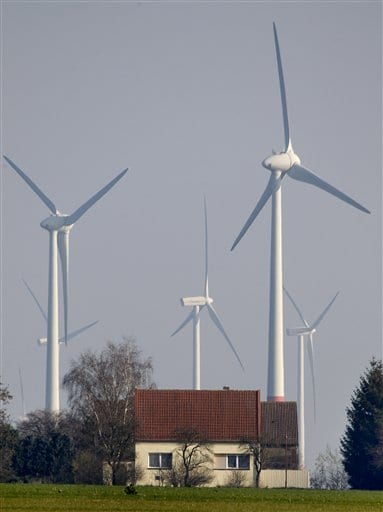I just mailed my absentee ballot from Japan for the next German election. Living in Japan, I needed to fill out some forms and send them in to my last place of residence in Germany, but I thought this election is important enough to jump through those hoops.
Of course I voted for the Green Party.
One of the topics in this election season is the price of electricity. There is a lot of confusion around. Many people don’t understand that the renewable revolution caused by the German feed-in tariff model has lowered prices.
This is also a season to discuss the surcharge, which will be fixed for next year on October 15. Spiegel has an article on the topic, and Craig Morris has discussed that article here.
Morris links to an interesting study done by Brainpool for the German Green party (21 page PDF file), which looks at the next surcharge decision in some detail.
From that we learn (page 1) that German wholesale electricity prices are down from 5.115 cents estimated in 2012 to around 3.9 cents. Let’s just note that renewable energy has reduced wholesale prices by 1.2 cents per kWh.
Multiply that by the 482 TWh they expect Germany to consume next year (page 21) , and we see that renewable energy will reduce wholesale prices by EUR 5.784 billion ($A8.5 billion) next year.
Of course these lower prices will lead to a higher surcharge next year, since the surcharge is calculated by the difference between the feed-in tariff and the wholesale price.
But that’s only a temporary effect. It will be gone after a decade or two.
In contrast, the lower prices from a higher renewable share are here to stay. Those solar panels are not going anywhere.
Even if renewable energy did not reduce prices, as it already does, it would add to Germany’s price stability as a hedge against higher fossil fuel prices in the future.
But it does. Renewable energy reduces electricity prices in Germany.
And this is still only the beginning. Over the next couple of decades, electricity will reach at least 80 percent renewable share (Article 1 of the Law on Priority for Renewable Energy).
Of course there is also that “global warming” problem we seem to have. The analysis above doesn’t even mention that phasing out fossil fuels will reduce the costs from global warming damages.
We also learn from the Brainpool study I mentioned above (page 21), that the surcharges are expected to go up by 0.07 cents for another 4 GW solar over the year. That’s a killer number (007). It should lay to rest forever the outdated idea that solar is expensive.
And trying to slow down new solar in Germany right as costs have come down and we can finally reap the benefits from introducing it at rock bottom prices is a very stupid idea. If it was the right thing to build the World’s biggest solar infrastructure back when prices were really high (and it was the right thing to do), then it doesn’t make any sense at all to stop now.
This article was originally published on Karl-Friedrich Lenz’s Lenz Blog. Reproduced with permission










